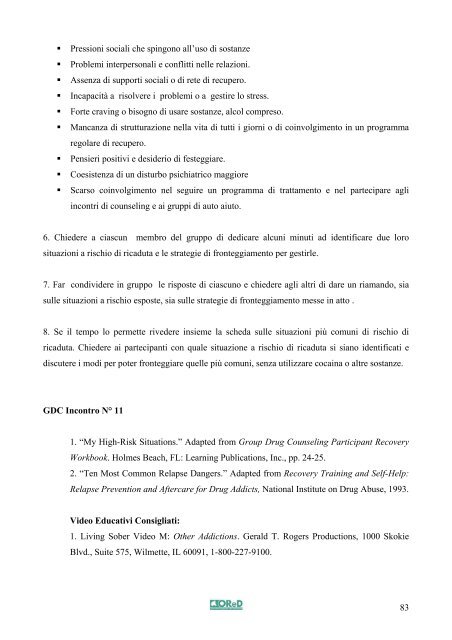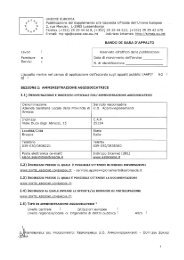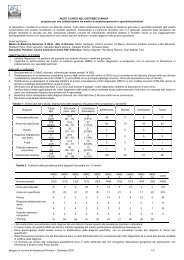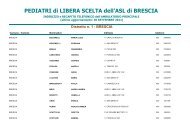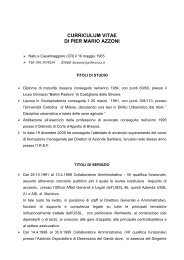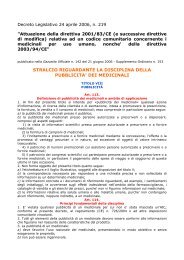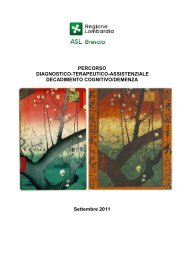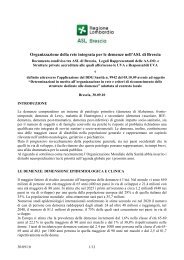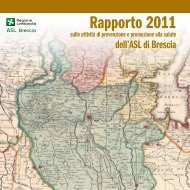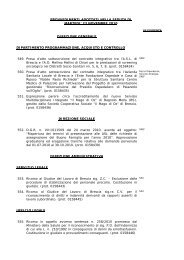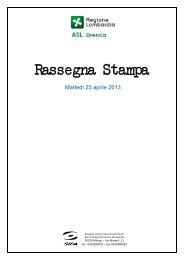Manuale di terapia per la tossicodipendenza - ASL di Brescia
Manuale di terapia per la tossicodipendenza - ASL di Brescia
Manuale di terapia per la tossicodipendenza - ASL di Brescia
You also want an ePaper? Increase the reach of your titles
YUMPU automatically turns print PDFs into web optimized ePapers that Google loves.
Pressioni sociali che spingono all’uso <strong>di</strong> sostanze<br />
Problemi inter<strong>per</strong>sonali e conflitti nelle re<strong>la</strong>zioni.<br />
Assenza <strong>di</strong> supporti sociali o <strong>di</strong> rete <strong>di</strong> recu<strong>per</strong>o.<br />
Incapacità a risolvere i problemi o a gestire lo stress.<br />
Forte craving o bisogno <strong>di</strong> usare sostanze, alcol compreso.<br />
Mancanza <strong>di</strong> strutturazione nel<strong>la</strong> vita <strong>di</strong> tutti i giorni o <strong>di</strong> coinvolgimento in un programma<br />
rego<strong>la</strong>re <strong>di</strong> recu<strong>per</strong>o.<br />
Pensieri positivi e desiderio <strong>di</strong> festeggiare.<br />
Coesistenza <strong>di</strong> un <strong>di</strong>sturbo psichiatrico maggiore<br />
Scarso coinvolgimento nel seguire un programma <strong>di</strong> trattamento e nel partecipare agli<br />
incontri <strong>di</strong> counseling e ai gruppi <strong>di</strong> auto aiuto.<br />
6. Chiedere a ciascun membro del gruppo <strong>di</strong> de<strong>di</strong>care alcuni minuti ad identificare due loro<br />
situazioni a rischio <strong>di</strong> ricaduta e le strategie <strong>di</strong> fronteggiamento <strong>per</strong> gestirle.<br />
7. Far con<strong>di</strong>videre in gruppo le risposte <strong>di</strong> ciascuno e chiedere agli altri <strong>di</strong> dare un riamando, sia<br />
sulle situazioni a rischio esposte, sia sulle strategie <strong>di</strong> fronteggiamento messe in atto .<br />
8. Se il tempo lo <strong>per</strong>mette rivedere insieme <strong>la</strong> scheda sulle situazioni più comuni <strong>di</strong> rischio <strong>di</strong><br />
ricaduta. Chiedere ai partecipanti con quale situazione a rischio <strong>di</strong> ricaduta si siano identificati e<br />
<strong>di</strong>scutere i mo<strong>di</strong> <strong>per</strong> poter fronteggiare quelle più comuni, senza utilizzare cocaina o altre sostanze.<br />
GDC Incontro N° 11<br />
1. “My High-Risk Situations.” Adapted from Group Drug Counseling Participant Recovery<br />
Workbook. Holmes Beach, FL: Learning Publications, Inc., pp. 24-25.<br />
2. “Ten Most Common Re<strong>la</strong>pse Dangers.” Adapted from Recovery Training and Self-Help:<br />
Re<strong>la</strong>pse Prevention and Aftercare for Drug Ad<strong>di</strong>cts, National Institute on Drug Abuse, 1993.<br />
Video Educativi Consigliati:<br />
1. Living Sober Video M: Other Ad<strong>di</strong>ctions. Gerald T. Rogers Productions, 1000 Skokie<br />
Blvd., Suite 575, Wilmette, IL 60091, 1-800-227-9100.<br />
83


